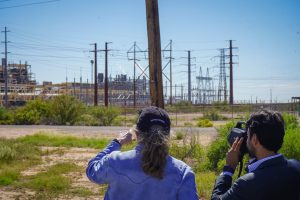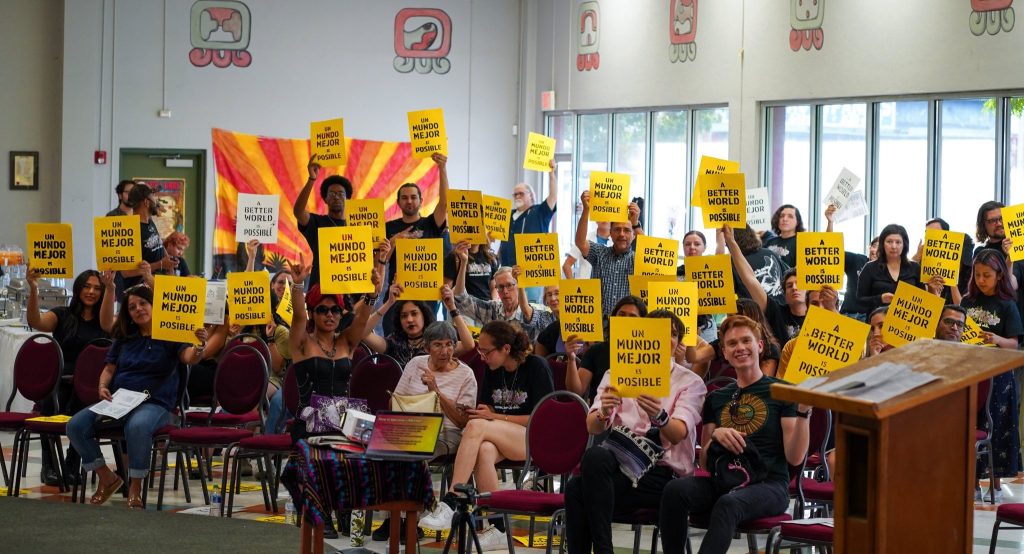Our movements must win the battlefront of electric utilities to force a prioritization of health and climate–not fossil fuel profits
By Miguel Escoto
Profits Determine Outcome
Big oil companies–the Shell’s, Exxon’s, and Chevron’s of the world–have been rightly identified by the public as villains responsible for the climate crisis. More obfuscated but nonetheless culpable is a lucrative private industry that facilitates exponential oil and gas extraction: utilities. Privately run, profit-motivated Investor Owned Utilities (IOUs)–like the notorious PG&E in California–are bedfellows with the worst climate villains. Sometimes, like in my hometown of El Paso, Texas, they are the climate villains. As Kate Aronoff, et al. write in A Planet to Win, “the fossil fuel industry and private utilities work hand-in-hand as masters of an energy system dominated by shareholders and driven by all of the wrong priorities.”
The perverse ideology of prioritizing “profits over people” can largely explain the current worldwide contradiction of the climate crisis: governments and institutions of power consistently choosing short term profits for a tiny minority at the expense of health, environmental and economic benefits for the majority of the masses. This same cancer has infected the utility sector. PG&E holds an abysmal record of ignoring safety protocols to increase profits. The investor-owned utility has sparked a total of 31 wildfires (exacerbated by climate change)–killing 113 Californians and burning nearly 1.5 million acres. In February of 2021, Storm Uri storm (exacerbated by climate change) slammed Texas, unleashing a series of power outages, causing wide-scale failure of oil and gas infrastructure and killing 246 Texas. A key contributor to these deaths was the political decision by ERCOT–Texas’ interconnected utility grid–to cut corners, boost profits and avoid vital “winterization” regulations, which would have prevented power outages during the storm. Additionally financial giants like JP Morgan Chase and Barclays–currently funding climate destroying fossil fuel projects–have entered the utility sector battlefield, learning from the predatory practices of Enron Corp. Both banks have been fined in the hundreds of millions for manipulating energy markets for profit at the expense of utility ratepayers. Crucially, utilities also determine how much fossil fuel generation (and pollution)–as opposed to clean energy–a community faces. My hometown of El Paso, Texas is an important case study.
Utilities become the Climate Villains
Nicknamed the “Sun City,” El Paso, Texas is the 10th sunniest city on the planet–enjoying vast solar energy potential. Yet the private utility monopoly that runs the electric grid in the region generates only a measly amount of solar or renewable energy–5% of the total portfolio. Both a for-profit company and a utility monopoly in the region, El Paso Electric Co. (EPE) is an anomaly even in Texas–where most utilities are either private or competing in a regional market. This system of “hyperprivatization” leaves El Pasoans in a starkly powerless relationship with their energy provider–with hardly any political or legal mechanisms to keep the corporation accountable. EPE, founded in 1901, made a business decision for its stakeholders to align itself with the surrounding fossil fuel industry. Natural gas from the Permian Basin–America’s highest producing and world’s worst polluting oilfield–constitutes the majority of the utility’s energy portfolio.
Despite its obvious solar potential, the utility operates three major gas plants in the region. Oilfield Witness Director Sharon Wilson and I have documented massive emissions from two of these: Newman Generating Station and Montana Vista Power Plant.

Oilfield Witness Director Sharon Wilson narrates the pollution made visible through the OGI camera to Drew Setlur, a representative of Congressman Ro Khanna
These plants access fracked gas produced in the Permian from methane-blasting oil and gas like this one. Pipelines companies like the Kinder Morgan-owned El Paso Natural Gas Co. transport the fracked gras from the oilfields to gas plants–but not without blowdown emission events like the one Sharon and I captured in September 2020. From extraction to transportation to the generation into electricity, the fossil fuel based power source El Paso Electric Co. has chosen harms the planet, economically contributes to the world’s worst oilfield, and directly pollutes the +80% Latino border community of El Paso, Texas / Ciudad Juárez, Mexico. In fact, the Newman Generating Station–along with the Marathon Petroleum Oil Refinery (also hooked up to the Permian)–is a top driver for emissions in the region. These industrial emissions contribute to El Paso suffering as the 14th most polluted city in the country when it comes to ozone–translating to asthma, respiratory illness, and premature deaths.
Pollution to the Bitter End
The logic of private utilities is therefore to align themselves with fossil fuel interests (where they can ensure profit) at the expense of climate and the health of the ratepayers which keep their business afloat. El Paso Electric created optimal fossil-profiting conditions–enough to attract the attention of JP Morgan Chase, the world’s largest financier of the climate crisis. In 2020, a JP Morgan-controlled private equity firm purchased EPE for $4.3 billion, awarding the company Board Members payouts and stock share awards ranging from $800,000 to over $8.8 million. I was part of a community movement opposing the buyout, warning the City of El Paso that JP Morgan’s dangerous track record on the climate would lead the utility to double-down on its fossil fuel investments. For example, JP Morgan is a top investor of the Permian fracking company Diamondback–a horrible polluter Sharon and I have documented with an unforgivable record of nearly killing oilfield workers. Diamondback operations could potentially feed fracked gas into the JP Morgan-owned generating stations that convert the fuel into electricity. This opens the possibility for dangerous vertical integration which locks in continued fossil fuel extraction and consumption.
Shortly after the finalization of the buyout, El Paso Electric sought permits for–you guessed it–a major fossil fuel project. Costing over a hundred million dollars for taxpayers, the Newman 6 project would add a 228 MW generator to Newman Generating Station and increase pollution for the whole of El Paso, but especially the low-income, mixed status community of Chaparral closest to the plant. As I argued in an op-ed responding to EPE CEO Kelly Tomblin, the project’s budget is better spent increasing the utility’s renewable energy portfolio. We launched a campaign to stop the project, culminating in winning standing before the TCEQ to legally contest EPE’s air permit. Chaparral residents, directly impacted by Newman, provided powerful testimonies on how the plant has impacted their health. Nonetheless, with the cards stacked against us in a pro-industry Texas regulatory system, the coalition ultimately decided to reach a settlement. Though bittersweet, the fight lead to substantial concessions from the utility, including: a prohibition on ever expanding the plant; a four year moratorium any new fossil fuel projects; CO2 pollution from Newman 6 by 500,000 tons; ozone-forming NOx pollution reduction by 50 tons; $400,000 for the community improvement projects, and more. The JP Morgan buyout and Newman 6 expansion project teach us a vital lesson about the fossil fuel industry in the current era of climate crisis: they won’t back down. Despite a general progress in public opinion towards climate action and pompous, toothless declarations by governments at global climate conferences, the fossil fuel industry does not plan on ending their model of extraction-based profiteering. To the bitter end, they will continue to use utilities as one of their weapons to maintain power. Victories are forced from these companies through direct confrontation, such as the Newman campaign.

Membership Launch of “Amanecer People’s Project” Sept 30th 2023. In the aftermath of the El Paso Climate Charter Proposition K election, they commit to continuing to organize for community control over the electric grid in El Paso
Victory through Public Control
In the aftermath of the bittersweet Newman 6 settlement, the coalition understood that the fight was not over. The coalition used some of the EPE settlement money to launch an ambitious climate action ballot initiative, “The El Paso Climate Charter,” that would have established a Climate Department within the City of El Paso to: increase renewables, create climate jobs, conserve our water (preventing it from being shipped off for fracking in the Permian), and–vitally–beginning the process of converting El Paso Electric into a publicly controlled utility, “municipalization.” Flabbergasted, the EPE CEO Kelly Tomblin confessed to the press: “We thought when we gave them the money, that that money would be used for beautification, parks, stuff for their community. Not to fight us.” After the organization Sunrise El Paso (now Amanecer People’s Project) collected nearly 40,000 signatures to place the measure on the ballot, this power-challenging proposal was up for vote. Fossil fuel opposition to the measure was vicious–launching a disinformation campaign to lie to voters through TV, radio, mail and billboards about the Climate Charter policy. An alliance opposition consisting of El Paso Electric, Marathon Petroleum, the El Paso Chamber of Commerce and a Trump-affiliated fossil fuel interest group Consumer Energy Alliance spent over $1 million to defeat the measure–outspending the climate campaigners nearly 10-to-1. Their disinformation campaign and extreme flood of money was successful; the Proposition was resoundingly defeated.
The Climate Charter struck a nerve with this JP Morgan-owned utility and its fossil fuel compadres. They are comfortable in the profit-generating Fossil Empire they’ve worked so hard to build–an empire where the game is rigged and the masses always lose. Forget the free market, or economic competition. It was recently reported that El Paso Electric is nearly $37 million over budget in their construction of Newman 6; they count on transferring over this 26% overrun onto the consumer, increasing rates. (They also plan on charging the $400,000 in community settlement funds onto the consumer, instead of cutting into their profit margin). This “corporations always win, consumers always get screwed” doctrine is all too common in the fossil fuel industry. The unprecedented Summer heat of 2023 (exacerbated by the climate crisis) caused the fragile oil and gas infrastructure of West Texas to dump 362 tons of natural gas (methane) into the atmosphere. Though some (not all) of this venting is preventable, yet costly, the Fossil Empire protects companies from suffering financially from their emissions. As Bill Caram, executive director of the nonprofit watchdog group Pipeline Safety Trust, describes: “The end user ends up paying for the gas whether it gets delivered or not,” he said. “If it gets released in these emission events, operators still make money.”
The fossil fuel industry is unmistakably winning the battlefield of electric utility–so far. Fossil fuel corporations, climate villain banks and predatory shareholders use the unavoidably necessary electric grid as their profit-churning playground. But there is a solution: public control of a public necessity. Roads, firefighters, libraries, parks, schools: successful social movements have convinced the American politic of their social necessity and therefore overwhelmingly place it’s management under public owned, democratic control–though the right continues to chip away at these public institutions. We can do the same for the energy sector. There is historical precedent through the 1930’s New Deal’s “Rural Electrification Administration.” To once more quote A Planet to Win, “Considering the urgency of a massive transition to renewable energy, what’s so instructive about the New Deal’s public power initiatives is their emphasis on democratic planning as a means to get things done at scale.” Renewables are popular. Lower electricity rates are popular. (Publicly owned utilities generally charge their customers lower rates). We can’t buy into the illusion that utilities are neutral, apolitical entities; they are a battlefield for the fate of the world. Winning the utility front gets us substantially closer to ending the fracking and drilling, the pipelines, refineries and gas plants. It’s worth our fight.